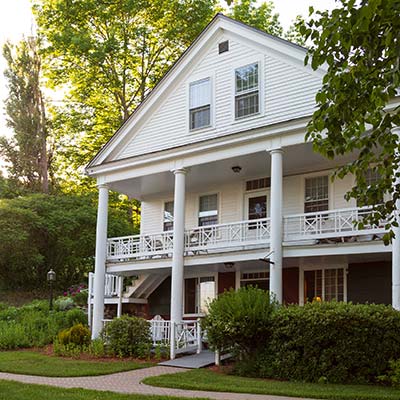by Doug Carleton of Business Lenders, LLC
Seller financing is often used in the bed and breakfast industry as a way to facilitate sales. It may be the first mortgage, or, it may be a second mortgage in conjunction with a first mortgage provided by a traditional lender. Let’s take a look at some of the benefits, pitfalls and risks – the good, the bad and the ugly – of seller financing.
The Good
Probably the biggest benefit of seller financing is that it can be simple. The buyer makes a down payment and the seller provides the first mortgage to the buyer. In order for a seller to consider providing the mortgage, the down payment from the buyer should be at least 20% to assure the seller that the buyer will not walk away from the property if the business is not living up to the buyer’s expectations. The property is the collateral for the loan, and the seller files and records a lien so that they can step back in and take over the property if the buyer defaults on the mortgage.
Seller financing can be flexible. The repayment terms can be negotiated between the buyer and seller in order to make the transaction work. For example, if the buyer needs to build up the inn’s revenues, the mortgage payments might be interest-only for a period of time. Or, if the seller was comfortable with the down payment, payments might be postponed for a certain period. It is entirely up to the buyer and seller. None of the requirements of traditional lenders are involved.
Another benefit is that less information may be required when the seller holds the mortgage. Since the sellers already own the property, they know the property first hand and don’t have to require the usual appraisal process. They only need to be satisfied that the buyer will be able to successfully operate the inn and make the mortgage payments. This does not mean that the buyer might not want an appraisal. But in the future, if the buyer goes to a traditional lender to refinance the seller mortgage, a new appraisal will almost certainly be required because lenders generally do not accept appraisals done exclusively for buyers or sellers.
Seller financing also broadens the pool of potential buyers. If a seller insists on totally cashing out on their sale, the cash the buyer has for down payment and a traditional lender’s mortgage commitment must equal the agreed-upon sales price. If it does not, a sale might not take place. But if the seller is willing to provide some (or all) of the mortgage, it may open the property up to a larger pool of buyers.
Seller financing may enable a sale to be completed where the buyer is able to get a traditional mortgage but there is a gap between the sale price, what the buyer has for a down payment and what the lender will lend. In such a case, if the seller is willing to hold a mortgage for the difference, which would be a second mortgage subordinated to the first mortgage lender, the sale may get completed, enabling the seller to receive the lion’s share of the price in cash at closing.
The Bad
The primary disadvantage of seller financing, especially if the seller provides the whole mortgage, is that the seller only gets a minimum amount of cash at closing – the buyer’s down payment. The majority of the sellers’ money is still tied up in the property, even though they are now receiving mortgage payments from the buyer. When most owners are ready to sell their inns, they want to cash out and move on. By financing the mortgage, the seller no longer has to worry about the 24/7 life of the innkeeper, yet they are not completely free of the property until the buyer pays off the mortgage.
In addition to getting less cash at closing, the seller still retains some of the risks from the business while turning the management over to a new owner. In the bed and breakfast industry, the personal relationships established between the innkeeper and guests can have a great deal to do with the success of the inn. If the new owner does not greet the long-time guest who was supposed to arrive at five o’clock, but doesn’t arrive until midnight, with the five o’clock warmth, that guest might decide that it is time not to come back to that inn in the future (“…the old owner would have greeted us with open arms no matter what time it was….”). If things like this happen often enough, revenues may begin to fall, jeopardizing the mortgage payments.
The Ugly
How can seller financing be ugly? One answer might be in situations where the availability of seller financing encourages a buyer to overpay for a property. In today’s marketplace, more and more B&B properties are coming on the market at prices that are not justified by the historical operating numbers.
A situation could arise in which a buyer has a certain amount of down payment and a traditional mortgage lender is willing to make a loan, but the combination is still well short of the asking price. The seller might be willing to make up the difference by holding a second mortgage. But unless a property is seriously under-performing, which could indicate that new, experienced management could make significant improvements in revenues and/or profits, a seller second mortgage could put a buyer in a position where a future sale, after paying off both mortgages, could yield little or no return on the buyer’s investment, and might even result in a loss.
There is often more than a little subjectivity involved in the purchase of a bed and breakfast, which can sometimes cloud a person’s judgment. The properties are frequently very nice houses, often in exceptional locations, and the lifestyle can appear to be very appealing. But unless the purchase of a B&B is purely as a hobby and money is not a concern, a buyer needs to step back far enough to look at it as a business and an investment. When you invest in a bed and breakfast, one of the ways that you will receive a return on your investment is, hopefully, a gain upon a future sale. If the combination of lender first mortgage and seller second mortgage means that the property will have to achieve a future sale price that is unrealistic based on the cash flow, then that seller second mortgage could jeopardize the future efforts of the buyer.
Handle with Care
Seller financing is often the only way to get a B&B sold in any reasonable amount of time. Structured correctly, it can benefit both the buyer and the seller, and often, the lender. For a lender, a subordinated second mortgage held by the seller creates additional equity for the buyer/borrower, allowing the lender’s first mortgage to be at a lower loan-to-value.
But structured correctly is the key. The cash flow generated by a B&B or inn that is available to make loan payments is the net income after tax, plus depreciation, amortization and interest. If the combination of first and second mortgage (the seller financing) payments exceed this figure, then the risk of achieving any gain on future sale is increased, as well as possibly to ongoing operations prior to a sale.





